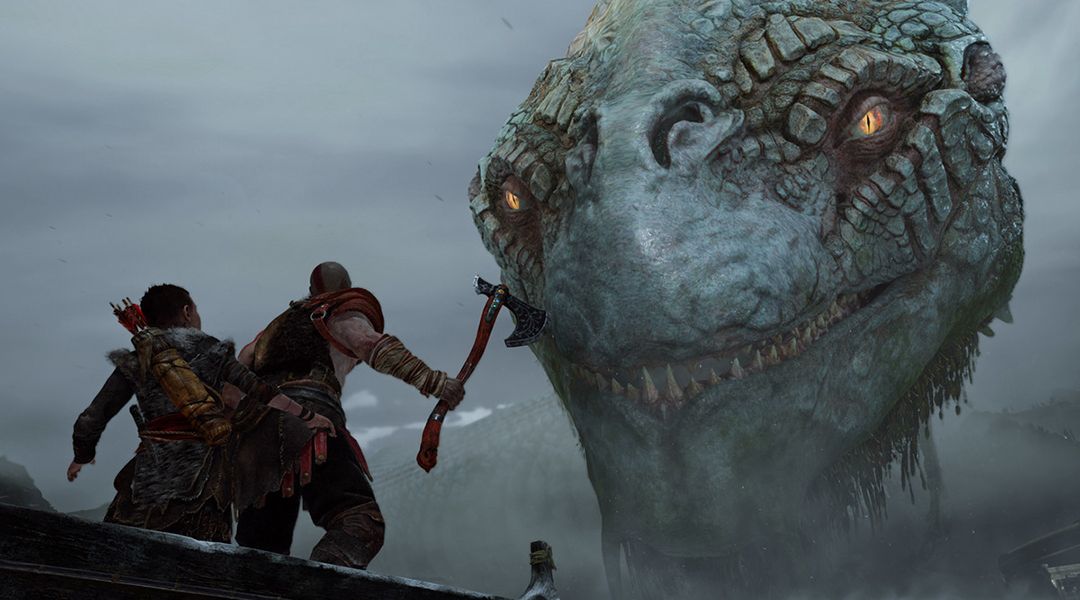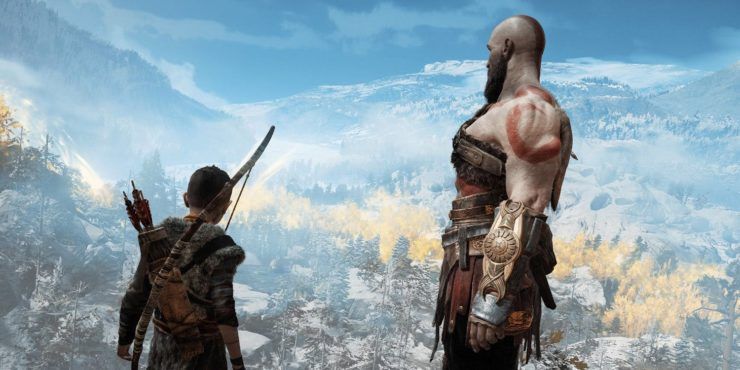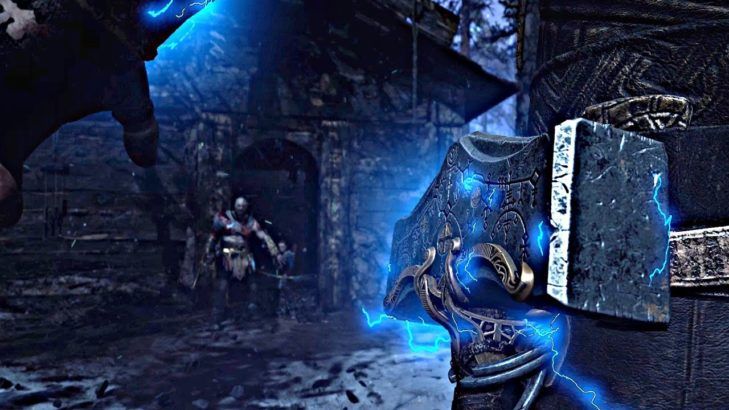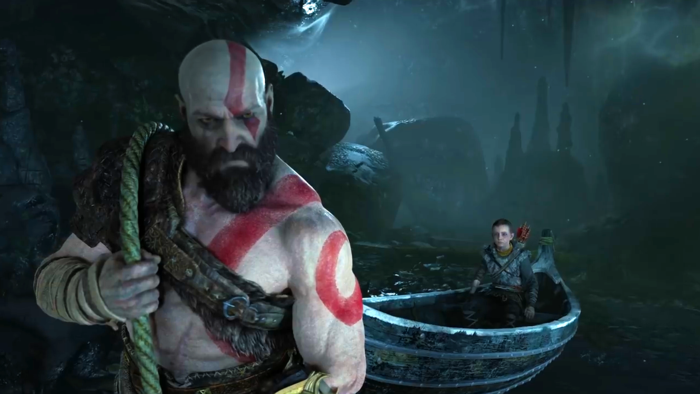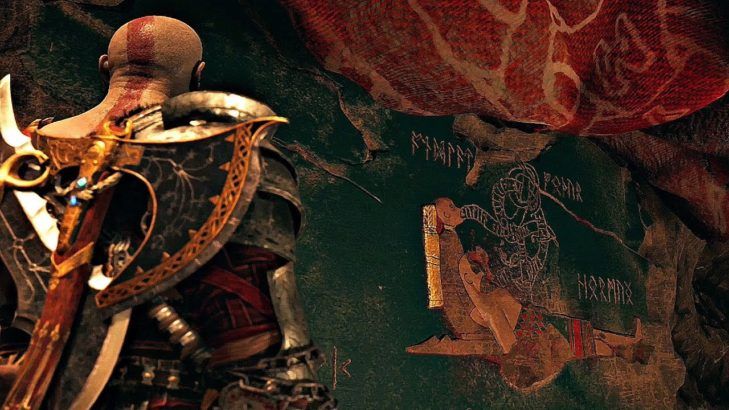By now, many fans have gone along with Kratos and Atreus on their quest across Midgard only to be left wondering what comes next. God of War sticks surprisingly close to Norse mythology at times, and we’re here to give you a rundown of Norse Mythology and what you can expect out of the next God of War games.
But first, this article will be discussing events that transpire at the end of the game, so if you haven’t finished God of War yet, head on back to Midgard and finish Dad and Boy’s epic quest. It’s one of the best games of the year so far, so we wouldn’t want to spoil any of it for you.
Atreus and Loki
At the end of the game, it is said that Faye wanted to give Atreus the name Loki. Thanks to Marvel, lots of people know about Norse Mythology’s trickster god, but he actually plays a large role in the Norse Pantheon. Loki, the son of giantess Laufey (Faye), is a pivotal player in the grand scheme of Norse Mythos. He is also the father to three key figures in the pantheon: Hel, Fenrir, and Jörmungandr (aka the World Serpent). Yes, if mythos is correct, Atreus is the father of the World Serpent.
While this hasn’t been officially confirmed yet in the God of War universe, the team at Sony Santa Monica have been extremely faithful to the Mythos so far. According to Mimir, The World Serpent was sent back in time during the events of Ragnarök to the time of the first game. Jörmungandr comments that Atreus is familiar to him, though the World Serpent does not make the revelation that it is his father.
It is also worth noting that Fenrir is currently missing from the picture. Fenrir is the giant wolf son of Loki, who is destined to grow large enough to swallow the sun. Fenrir is a pivotal figure in the tales of Ragnarök, as he is the one who is destined to kill Odin. We're not sure if Fenrir is already bound, or if he hasn't been born yet - which would help confirm the Jörmungander time-travel notion. However, the myth states that Fenrir is the father of Sköll and Hati, who are present in God of War’s lore shrines. We’ll have to wait and see if this great wolf rears his head when Atreus gets older.
Hel is also missing, or at least we don't see her. Helheim and the Hel-walkers are present, though since the realm and the goddess are named the same, it gets a bit confusing. Presumably she, too, has not been born yet, and she also plays a large roll in the fall of the gods.
Thor and Odin
If you’ve returned home after spreading Faye’s ashes, then you’ve seen the secret ending of the game – the arrival of Thor years after the events of the game. It’s clear that Kratos and Atreus may square off against the hammer-wielding god of thunder in the next game. Mimir speaks briefly that Jörmungandr and Thor are destined to fight and kill each other during the events of Ragnarök, but Mimir also mentions that the fight is so fierce that it destroys part of Yggdrasil and sends Jörmungandr back in time to before his own birth. The question is: will Kratos kill Thor, or will Jörmungandr? Perhaps the fight between Jörmungandr and Thor will send the Midgard Serpent back in time, leaving Kratos or Atreus to finish the job. Modi and Magni are said to survive Ragnarök and inherit Mjolnir. We know Magni is dead, and we assume Modi is dead - however we do not have solid confirmation of this.
Odin, the All-Father, was discussed heavily during the events of God of War, though we never saw the nefarious schemer. Odin matches up fairly well to how he is depicted in Myth. He is often portrayed as a seeker of wisdom and power, who will stop at nothing to get what he wants. Odin gets his way by lying, scheming, and tricking anyone he needs to. Though he didn’t carve out his eye wisdom in God of War, Mimir did mention that Odin sacrifices himself to himself on Yggdrasil to gain access to powerful magic.
By all accounts, Odin is a god of war in Norse mythology – alongside Tyr who is the god of justice. Odin is the gallows god, and all fights are dedicated to him. Odin foresees the events of Ragnarök, yet despite his knowledge, he still plays his part in bringing the events to fruition, including banishing Hel away and binding Fenrir. Kratos is sure to face off against the leader of the Æsir soon, likely in his home turf of Asgard.
Ragnarok
In Norse Mythology, the death of Baldur is one of the first catalysts for the beginning of the end. With the arrival of Fimbulwinter (the great winter), it means the great calamity that is Ragnarök is nearly upon us. Ragnarök is the end of days for nearly everything, including many of the gods in the Norse pantheon. If you listened to Mimir and Atreus talk, or if you found some specific lore markers, you will have heard mention of the cataclysmic event. It is the great showdown, where the dead rise, gods fall, and Surtr emerges from Muspelheim to rain fire down upon the world. If you’ve traveled to Muspelheim, you’ve seen Surtr’s sword, and Atreus has heard Surtr speak. If you travel there with Mimir, he also tells you about how Surtr’s fire is a cleansing fire that will let the world start anew.
The kicker for God of War fans is that, according to the mythos, Baldur will rise again during Ragnarök, and is supposed to be one of the surviving gods. Freya is prophesized to also survive the event, so perhaps Kratos and Freya will not fight one another – or at least not kill one another - despite her menacing threat after the death of her son. If one of the next installments in the God of War franchise takes place during Ragnarök, it will be chaotic for sure. Gods are foretold to face off against the fire giant Surtr, the World Serpent, the armies of Hel, and Loki himself. It would make sense for Atreus to take up arms against the Æsir, especially if he is the father of the World Serpent, Hel, and Fenrir.
The Cryptic Prophecy
At the end of God of War, Kratos and Atreus travel to Jötunheim to spread Faye’s ashes. While there, the two uncover a prophecy that tells the story of Atreus. On the hidden panel behind a tapestry is the image of Atreus cradling Kratos (or what most assume to be Kratos), alongside several Nordic runes.
When the runes are translated (a rough translation), the final section talks about a transfer of power (the odd snake-like tube connecting Atreus and Kratos). It also mentions something of a sacrifice for evolution, so perhaps Kratos dies and gives his powers to Atreus, which allows him to harness his full potential as a god. Kratos does mention, after the fight with Baldur, that he would allow Atreus to kill him if it meant keeping his son alive, definite foreshadowing when combined with these runes. Perhaps Atreus will carry on the franchise if Kratos dies in one of the future installments of the franchise.
Norse Mythology is rich in its stories. God of War players have heard bits and pieces of some of them through Mimir and the lore markers. But looking ahead toward the grim future of Midgard, the mythos holds a lot of hints for what to expect for Kratos and Atreus in the future.
God of War is now available exclusively for PS4.

